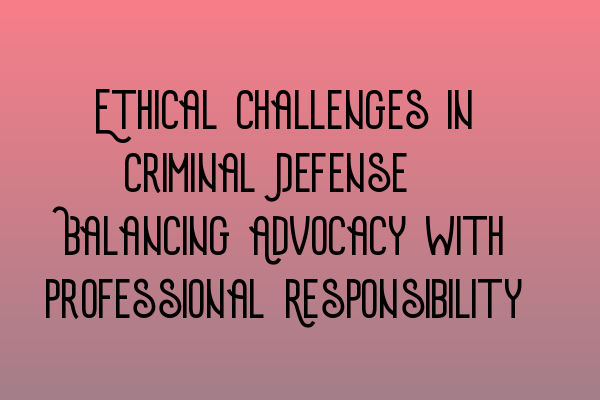Ethical Challenges in Criminal Defense: Balancing Advocacy with Professional Responsibility
As criminal defense solicitors, we are entrusted with the crucial task of safeguarding the rights and interests of our clients. We are driven by the principle that every individual deserves a fair and just defense, regardless of the nature of the crime they are accused of committing. However, the pursuit of justice comes with its own set of ethical challenges that must be effectively navigated to ensure the integrity of the legal profession.
The Role of Advocacy
Advocacy lies at the heart of criminal defense. It is our duty to zealously represent our clients, challenge the evidence presented against them, and strive for the most favorable outcome possible. But in the pursuit of this goal, it is essential to maintain a delicate balance between advocacy and ethical responsibility.
One of the primary ethical challenges faced by criminal defense solicitors is the obligation to represent clients whose actions may be morally reprehensible. It is not uncommon for us to defend clients accused of heinous crimes, such as murder or sexual assault. While these cases may provoke public outrage and moral condemnation, it is imperative to remember that every accused person is entitled to a defense, as enshrined in the principle of the Presumption of Innocence.
This ethical challenge requires us to put aside personal judgments and prejudices and focus solely on our professional duty to advocate for our clients. We must diligently investigate the facts of the case, analyze the evidence, and develop a robust defense strategy, all while upholding the fundamental principles of justice.
Confidentiality and Trust
Another ethical challenge that arises in criminal defense practice is maintaining the confidentiality of client information. Trust is the foundation of the solicitor-client relationship, and ensuring the confidentiality of communications is vital to the effective representation of our clients. Maintaining strict confidentiality not only protects the interests of our clients but also upholds the integrity of the legal system.
However, striking the right balance between confidentiality and our duty to prevent harm can be complex. In some cases, it may be necessary to breach client confidentiality if there is a real risk of harm to others or if required by law. Solicitors must carefully evaluate each situation, weighing the ethical obligations to the client against potential consequences for third parties.
Dealing with Unethical Client Requests
One of the most challenging ethical dilemmas faced by criminal defense solicitors is the handling of unethical client requests. While our duty is to advocate for our clients’ best interests, there are limits to what we can do within the bounds of the law and professional ethics.
When confronted with a client’s request to engage in unethical practices, such as suborning perjury or tampering with evidence, solicitors must firmly reject such requests. Upholding the principles of honesty, integrity, and respect for the legal process is paramount. By doing so, we not only protect our own professional integrity but also maintain the public’s trust in the legal system.
Continuing Professional Development
To effectively navigate the ethical challenges encountered in criminal defense, it is essential for solicitors to invest in their professional development. Staying abreast of updates in UK criminal laws, attending workshops and seminars on criminal practice, and enhancing one’s SQE criminal law study group experience are all vital steps towards maintaining ethical standards.
Workshops and Seminars on Criminal Practice: Expanding Your Expertise can provide solicitors with invaluable insights, practical knowledge, and networking opportunities. By constantly updating our skills and expanding our expertise, we can better navigate ethical challenges and provide the highest level of representation for our clients.
Conclusion
Ethical challenges are an inherent part of criminal defense practice. Balancing advocacy with professional responsibility requires solicitors to effectively navigate complex ethical dilemmas, maintain confidentiality, deal with unethical client requests, and continuously invest in their professional development.
By upholding the principles of justice, integrity, and the rule of law, criminal defense solicitors play a crucial role in ensuring the fairness and credibility of the legal system.
For more information and insights related to criminal law, check out these related articles:
